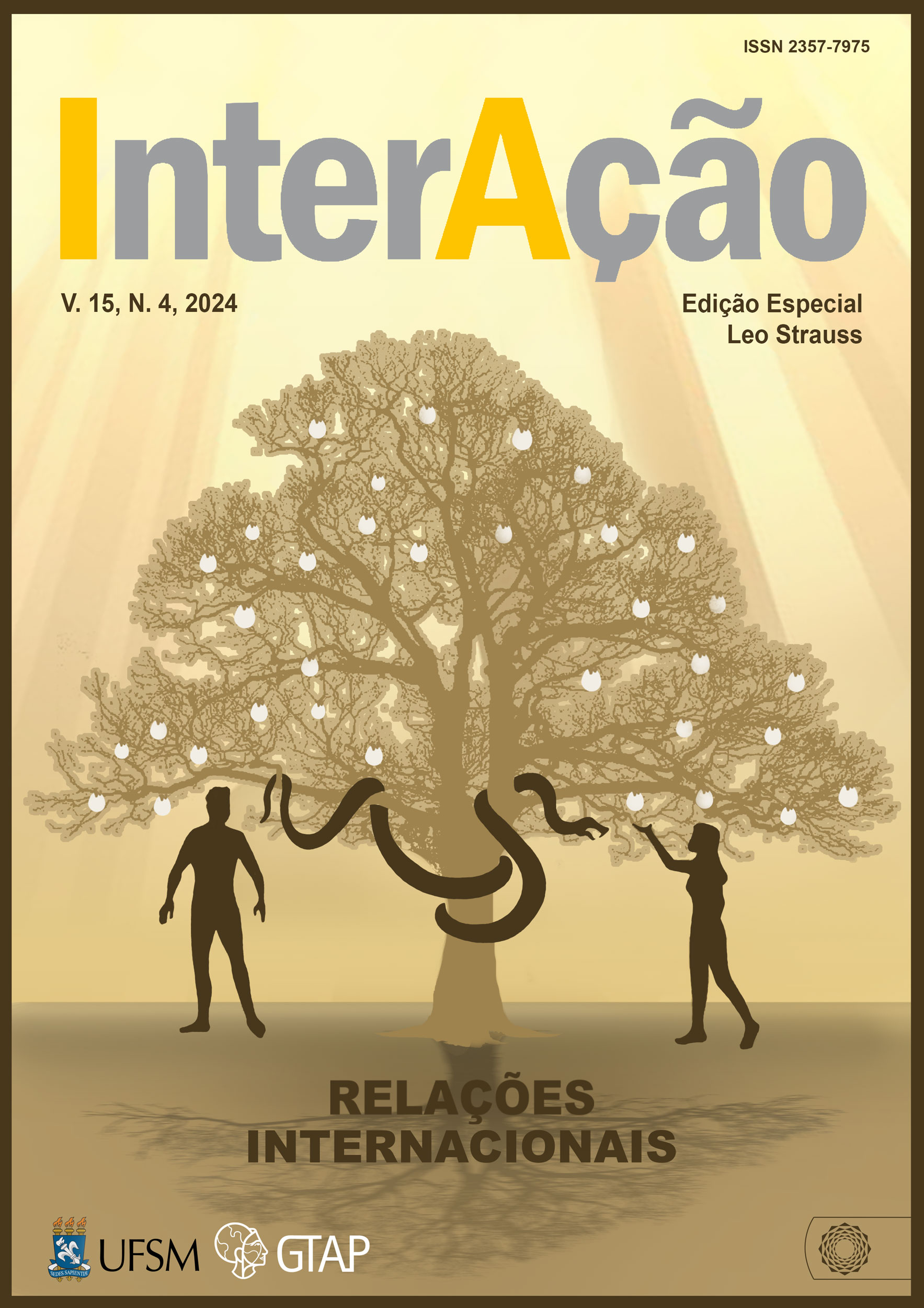A paradoxical philosophy: Machiavelli’s art of writing according to Leo Strauss
DOI:
https://doi.org/10.5902/2357797590004Keywords:
Leo Strauss, Machiavelli, Art of writing, Modernity, Classical philosophyAbstract
This article explores Leo Strauss's interpretation of Machiavelli's art of writing and its place in the history of political philosophy. Strauss argues that Machiavelli, the first modern political philosopher, employs the art of esoteric writing he inherited from the classical tradition. However, the outcome does not seem to be the preservation of the traditional teachings, but rather the beginning of a revolution in the philosophers' teaching on politics and philosophy. Three paradoxes emerge from Strauss's interpretation of Machiavelli: 1) that Machiavelli's originality is revealed through his return to the tradition; 2) that his novel teaching was already known by the classics; 3) that the immoderation of his discourse conceals a philosophical politics of moderation. These paradoxes frame the fundamental tension in Strauss's interpretation: whether Machiavelli deserves to be called a philosopher. In this article, we will explore these paradoxes, arguing that, for Strauss, Machiavelli employs the art of writing with the same purpose as the classics, namely, to mediate the tension between the city and philosophy. However, Machiavelli introduces a particular rhetorical device: he offers the city a "salutary philosophy" oriented toward civic well-being. In this study, we will assert that, for Strauss, Machiavelli's rhetorical innovation, introduces a change in the status and purpose of philosophy for the city and its citizens, but does not alter Machiavelli's understanding of philosophy and its unbridgeable distance from politics. Thus, we propose the hypothesis of thinking Machiavelli’s philosophy as paradoxical: his thought and life remain philosophical but his teaching conceals the figure of the philosopher, philosophy as the pursuit of truth, and the philosophical life.
Downloads
References
JENOFONTE. Memorabilia. Oeconomicus. Symposium. Apology. Harvard University Press. 1992.
MAQUIAVELO, N. Tutte le Opere di Niccolò Machiavelli. Vol. I y II. Milán: Arnoldo Mondadori Editore, 1949.
Mansfield, H. “Strauss on The Prince”. Review of Politics, 75(4). 2013. DOI: https://doi.org/10.1017/S0034670513000636
MEIER, H. Political Philosophy and the Challenge of Revealed Religion. University of Chicago Press. 2017. DOI: https://doi.org/10.7208/chicago/9780226275994.001.0001
MELZER, A. Philosophy between the Lines: The Lost History of Esoteric Writing. The University of Chicago Press. 2014. DOI: https://doi.org/10.7208/chicago/9780226175126.001.0001
MINKOV, Svetozar. “Hobbes as the Founder of Modern Political Philosophy” en Colen y Minkov (Eds). Toward "Natural Right and History": Lectures and Essays by Leo Strauss, 1937–1946. Chicago: The University of Chicago Press, 2018.
STRAUSS, Leo. The Political Philosophy of Hobbes: Its Basis and Its Genesis. Chicago: The University of Chicago Press, 1996 [1936]. DOI: https://doi.org/10.7208/chicago/9780226231815.001.0001
STRAUSS, Leo. The Spirit of Sparta or the Taste of Xenophon. Social Research, 6, pp. 502-536, 1939.
STRAUSS, Leo. On a New Interpretation of Plato's Political Philosophy. Social Research, 13 (3), pp. 326-367, 1946.
STRAUSS, Leo. Persecution and the Art of Writing. Glencoe: The Free Press, 1952.
STRAUSS, Leo. The Law of Reason in The Kuzari. In: Persecution and the Art of Writing (pp. 95-142). Chicago: The University of Chicago Press, 1952.
STRAUSS, Leo. Natural Right and History. Chicago: The University of Chicago Press, 1953.
STRAUSS, Leo. The Origins of Political Science and The Problem of Socrates. Interpretation: A Journal of Political Philosophy, 23 (2), pp. 127-222, 1996 [1958].
STRAUSS, Leo. Thoughts on Machiavelli. Chicago: The University of Chicago Press, 1958.
STRAUSS, Leo. What is Political Philosophy? And Other Studies. Chicago: The University of Chicago Press, 1959.
STRAUSS, Leo. On a Forgotten Kind of Writing. In: What is Political Philosophy? And Other Studies (pp. 221-233). Chicago: The University of Chicago Press, 1959.
STRAUSS, Leo. On Classical Political Philosophy. In: What is Political Philosophy? And Other Studies (pp. 78-95). Chicago: The University of Chicago Press, 1959.
STRAUSS, Leo. Restatement on Xenophon’s Hiero. In: What is Political Philosophy? And Other Studies (pp. 95-134). Chicago: The University of Chicago Press, 1988 [1959].
STRAUSS, Leo. Plato. In: STRAUSS, Leo and CROPSEY, Joseph (Eds.), History of Political Philosophy (pp. 33-89). Chicago: Rand McNally, 1963.
STRAUSS, Leo. Niccolò Machiavelli. In: STRAUSS, Leo and CROPSEY, Joseph (Eds.), History of Political Philosophy (pp. 210-228). Chicago: Rand McNally, 1963.
STRAUSS, Leo. The City and Man. Chicago: The University of Chicago Press, 1964.
STRAUSS, Leo. Spinoza’s Critique of Religion. Chicago: The University of Chicago Press, 1997 [1965].
STRAUSS, Leo. A Giving of Accounts. The College, 22 (1), pp. 1-5. 1970.
STRAUSS, Leo. The Three Waves of Modernity. In: BLOOM, Allan (Ed.), Political Philosophy: Six Essays by Leo Strauss (pp. 81-98). Chicago: The University of Chicago Press, 1975.
STRAUSS, Leo. “Correspondence with Hans Georg Gadamer Concerning ‘Wahrheit und Methode’ 1961”, en The Independent Journal of Philosophy/Unabhängige Zeitschrift für Philosophie 2. 1978. Pp. 5-12.
STRAUSS, Leo. Studies in Platonic Political Philosophy. Chicago: The University of Chicago Press, 1983. DOI: https://doi.org/10.7208/chicago/9780226193878.001.0001
STRAUSS, Leo. Reason and Revelation. In: MEIER, Heinrich (Ed.), Leo Strauss and the Theologico-Political Problem (pp. 141-180). Cambridge: Cambridge University Press, 2006 [1948]. DOI: https://doi.org/10.1017/CBO9781139177948.010
STRAUSS, Leo. Toward "Natural Right and History": Lectures and Essays by Leo Strauss, 1937–1946. Eds. COLEN y MINKOV. Chicago: The University of Chicago Press, 2018. DOI: https://doi.org/10.7208/chicago/9780226512242.001.0001
STRAUSS, Leo. What is Political Philosophy?. In: LENZNER, Steven and MINKOV, Svetozar (Eds.), Leo Strauss’ Published but Uncollected English Writings 1937-1972. Indiana: St. Augustine Press, 2024 [1955].
YAFFE, M., & RUDERMAN, R. (2014). Reorientation: Leo Strauss in the 1930s. Macmillan US. DOI: https://doi.org/10.1057/9781137381149
Downloads
Published
How to Cite
Issue
Section
License

This work is licensed under a Creative Commons Attribution-NonCommercial-ShareAlike 4.0 International License.







